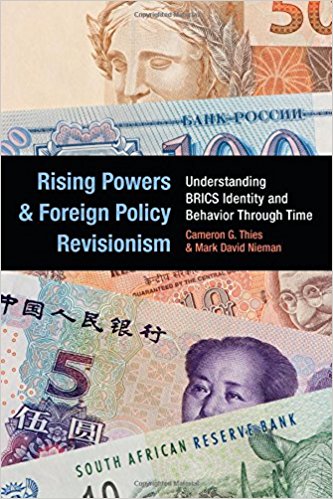
Mark Nieman challenges conventional international relations theory in his new book, "Rising Powers and Foreign Policy Revisionism," published in 2017 by University of Michigan Press.
Nieman, assistant professor of political science, studied the rising economic powers of Brazil, Russia, India, China, and South Africa (known as BRICS countries) while researching the book.
Traditional international relations theory holds that rising powers will become more conflict prone in order to challenge the international order for their own benefit.
Nieman and coauthor Cameron G. Thies, professor and director of the School of Politics and Global Studies at Arizona State University, challenge this theory through their systematic evaluation of the BRICS countries’ foreign policies. Nieman and Thies analyzed foreign policy for each country from 1870 on into the present day, comparing their stated foreign policy with their actions. They also evaluated each country’s economic and militarized conflicts, including what caused the conflicts.
"Most countries, with the exception of Russia, do not automatically become more conflictual with increases in power," Nieman said.
Russia is an exception, Nieman said, because it is generally more conflictual overall after Joseph Stalin consolidated power during the Soviet era. From this time forward, Russia has been more likely to intervene in affairs with neighboring countries, acting as a dominant regional power acting in a conflict management role.
However, in all of the BRICS countries that Nieman and Theis analyzed, it is domestic affairs that primarily affect their conflicts and foreign policies.
"We should be less concerned with just the power ratios with either neighbors or the US and focusing more on what’s happening domestically," Nieman said.
They also found that the countries stated foreign policy lined up with their actions. Nieman hopes this can alleviate fears from policy makers over the truthfulness of rising countries who say they do not want to be conflictual.
"If we can have research that suggests you can actually trust some of the words coming out of your potential opponents’ mouths and you don’t have to view them as an opponent, then there are mutually beneficial things that can be done," Nieman said.